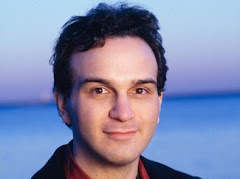This was maestro Roberto Abbado’s second concert in Kuala Lumpur. Having missed his debut here last time, I was glad that I caught the still youthful looking 64-year old maestro this time. Billed as an “Italian Symphony” night, there was a predominance of the A minor and A major keys in this concert.
Berlioz’s “Roman Carnival Overture” was the fine concert opener, especially with Abbado’s swift and upbeat tempi. The creamy-toned MPO viola section canonically answered the superbly played cor anglais solo by Michael Austin in the Andante sostenuto section. After a chromatic flourish in the woodwinds, the whole orchestra performed brilliantly to open this Italian themed concert with much flair and aplomb.
The Paganini Violin Concerto No 5 in A minor was the next piece in the concert. The excellent Russian soloist, 46-year old Sergej Krylov made his debut in Kuala Lumpur in the concerto, which was also receiving its premiere performance in the DFP Hall.
From the dramatic opening tutti which bears familiar resemblance to an earlier Paganini piece, the Sonata Varsavia, Abbado and Krylov worked hand in glove to present this rarely performed concerto in an excellent musical light.
With the composer’s brilliant high-wire writing of spectacular scales and arpeggios, double and triple stops, artificial harmonics and ricochet bowing, Krylov’s marvellous technique showed literally no sign of strain. More importantly, Krylov’s interpretation was a musical success as the lyrical portions were given their due.
Abbado worked in hand with Krylov, making minor slowing in tempi to accommodate the lyrical and melodious portions, whilst making minor accelerandos to emphasize the more dramatic and operatic sections of the concerto.
The only musical issue in the first movement was the choice of Krylov’s cadenza that seemed a bit prolix and did not make much use of the musical material of the first movement. Perhaps it might have been better to use the Remy Principe/Salvatore Accardo cadenza, which is found on Accardo’s 1970s DG recording.
The second movement was a superb performance from Krylov in terms of cantabile and legato bowing, akin to a very smooth operatic aria sung on the violin. Lovely and modulated vibrato usage also aided the very succulent Italianate tone that Krylov drew from his instrument.
The final third movement gave Krylov yet more chances to display his musical vivacity coupled with abundant technical fireworks. This time, the display included a cheeky and impish Rondo theme that delighted the audience on its myriad repetitions.
That superb performance drew endless applause from the KL audience and Krylov obliged them with yet more Paganini, his famous 24th Caprice in A minor. This encore was also stunning in its execution especially the variation in tenths that was taken very swiftly and the difficult left-hand pizzicato section.
The audience refusing to let him go after the 24th Caprice, Krylov played yet another encore. This time, he did not announce the encore but launched straight into Paganini’s 13th Caprice in B flat major. With its opening descending chromatic thirds, Krylov managed to make the notes to sound like “The Devil’s Laughter”, which is what this Caprice is fondly nicknamed.
The second half of the program began with Luciano Berio's Four Original Versions of "Ritirata notturna di Madrid" after Boccherini's String Quartet in C major, nicknamed Night Music of the Streets of Madrid.
The work begins with soft snare drums, which are then followed by additional instruments joining in the festivities. After the grand crescendo is reached, the music begins a slow and steady decrescendo. The MPO and Abbado obviously enjoyed playing this delightful piece.
The final work was Mendelssohn's familiar Symphony No 4 in A major "Italian". Maestro Abbado took the first movement at joyous pace. Played with the full lead-back into exposition repeat, this was very fulfilling as we were able to hear Mendelssohn’s immense joy on seeing Italy for the first time.
The second movement provided a good opportunity for the MPO winds to demonstrate their warmth and subtlety, depicting a procession in Naples. The violins flowed smoothly in their legato portions in the third movement, whilst the French horns played well without any spilt notes in the Trio portion of that movement.
The final movement (Saltarello) was taken at a brisk pace with some really fine and rhythmic staccato violin playing. Maestro Abbado and the MPO sounded really well together and enjoyed many rounds of deserved and loud applause.
It would be very nice to watch yet another Italian night here in future with Abbado and Krylov. Perhaps a programme like Rossini’s Italian Girl in Algiers Overture, Paganini’s Fourth or Sixth Violin Concerto, Respighi’s Pines of Rome and Tchaikovsky's Capriccio Italien may appeal to audiences here.
Subscribe to:
Post Comments (Atom)


















































No comments:
Post a Comment